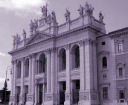1. Now before the feast of the passover, when Jesus knew that his hour was come that he should depart out of this world to the Father, having loved his own which were in the world, he loved them to the end.
2. And supper being ended, the devil having now put into the heart of Judas Iscariot, Simon's son, to betray him;
3. Jesus knowing that the Father had given all things into his hands, and that he was come from God, and went to God;
4. He rises from supper, and laid aside his garments; and took a towel, and girded himself.
5. After that he pours water into a basin, and began to wash the disciples' feet, and to wipe them with the towel wherewith he was girded.
THEOPHYL. Our Lord being about to depart out of this life, shows His great care for His disciples: Now before the feast of the Passover, when Jesus knew that His hour was come that He should depart out of this world to the Father, having loved His own which were in the world, He loved them to the end.
BEDE. The Jews had many feasts, but the principal one was the passover; and therefore it is particularly said, Before the feast of the passover.
AUG. Pascha is not a Greek word, as some think, but Hebrew: though there is remarkable agreement of the two languages in it. The Greek word to suffer being pascha has been thought to mean passion, as being derived from the above word. But in Hebrew, pascha is a passing over; the feast deriving its name from the passing, of the people of God over the Red Sea into Egypt. All was now to take place in reality, of which that passover was the type.
Christ was led as a lamb to the slaughter; whose blood sprinkled upon our doorposts, i.e. whose sign of the cross marked on our foreheads, delivers us from the dominion of this world, as from Egyptian bondage. And we perform a most wholesome journey or passover, when we pass over from the devil to Christ, from this unstable world to His sure kingdom. In this way the Evangelist seems to interpret the word: When Jesus knew that His hour was come when He should pass over out of this world to the Father. This is the pascha, this the passing over.
CHRYS. He did not know then for the first time: He had known long before. By His departure He means His death, Being so near leaving His disciples, He shows the more love for them: Having loved His own which were in the world, He loved them to the end; i.e. He left nothing undone which one who greatly loved should do. He reserved this for the last, that their love might be increased by it, and to prepare them by such consolation for the trials that were coming.
His own He calls them, in the sense of intimacy. The word was used in another sense in the beginning of the Gospel: His own received Him not. It follows, which were in the world: for those were dead who were His own, such as Abraham, Isaac, and Jacob, who were not in the world. These then, His own which were in the world, He loved all along, and at the last manifested His love in completeness: He loved them to the end.
AUG. He loved them to the end, i.e. that they themselves too might pass out of this world, by love, to Him their head. For what is to the end, but to Christ? For Christ is the end of the law for righteousness to everyone that believes (Rom 10:4). But these words may be understood after a human sort, to mean that Christ loved His own up to His death.
But God forbid that He should end His love by death, who is not ended by death: except indeed we understand it thus: He loved His own to death: i.e. His love for them led Him to death. And supper having been made, i.e. having been got ready, and laid on the table before them; not having been consumed and finished: for it was during supper that He rose, and washed His disciples' feet; as after this He sat at table again, and gave the sop to the traitor.
What follows: The devil having now put it into the heart of Judas Iscariot, Simon's son, to betray Him, refers to a secret suggestion, not made to the ear, but to the mind; the suggestions of the devil being part of our own thoughts. Judas then had already conceived, through diabolical instigation, the intention of betraying his Master.
CHRYS. The Evangelist inserts this as if in astonishment: our Lord being about to wash the feet of the very person who had resolved to betray Him. It shows the great wickedness too of the traitor, that even the partaking of the same table, which is a check to the worst of men, did not stop him.
AUG. The Evangelist being about to relate so great an instance of our Lord's humility, reminds us first of His lofty nature: knowing that the Father had given all things into His hand, not excepting the traitor.
GREG. He knew that He had even His persecutors in His hand that He might convert them from malice to love of Him.
ORIGEN The Father has given all things into His hands; i.e. into His power; for His hands hold all things; or to Him, for His work; My Father works hitherto, and I work (John 5:17).
CHRYS. Had given all things into His hand. What is given Him is the salvation of the believers. Think not of this giving up in a human way. It signifies His honor for, and agreement with, the Father. For as the Father has given up all things to Him, so has He given up all things to the Father. When He shall hare delivered up the kingdom to God, even the Father (1 Cor 15:24).
AUG. Knowing too, that He was come from God, and went to God; not that He left God when He came, or will leave us when He returns.
THEOPHYL. The Father having given up all things into His hands, i.e. having given up to Him the salvation of the faithful, He deemed it right to show them all things that pertained to their salvation; and gave them a lesson of humility, by washing His disciples' feet. Though knowing that He was from God, and went to God, He thought it in no way took from His glory, to wash His disciples' feet; thus proving that He did not usurp His greatness. For usurpers do not condescend, for fear of losing what they have irregularly got.
AUG. Since the Father had given all things into His hands, He washed not His disciples' hands indeed, but their feet; and since He knew that He came from God, and went to God, He performed the work not of God and Lord, but of a man and servant.
CHRYS. It was a thing worthy of Him, Who came from God, and went to God, to trample upon all pride; He rises from supper, and laid aside His garment, and took a towel, and, girded Himself.; After that He pours water into a basin, and began to wash His disciples' feet, anal to wipe them with the towel wherewith He was girded. See what humility He shows, not only in washing their feet, but in other things. For it was not before, but after they had sat down, that He rose; and He not only washed them, but laid aside His garments, and girded Himself with a towel, and filled a basin; He did not order others to do all this, but did it Himself, teaching us that we should be willing and ready to do such things.
ORIGEN. Mystically, dinner is the first meal, taken early in the spiritual day, and adapted to those who have just entered upon this day. Supper is the last meal, and is set before those who are farther advanced. According to another sense, dinner is the understanding of the Old Testament, the supper the understanding the mysteries hid in the New.
Yet even they who sup with Jesus, who partake of the final meal, need a certain washing, not indeed of the top parts of their body, i.e. the soul, but its lower parts and extremities, which cleave necessarily to earth. It is, And began to wash; for He did not finish His washing till afterwards. The feet of the Apostles were defiled now: All of you shall be offended because of Me this night (Matt 26:31). But afterwards He cleansed them, so that they needed no more cleansing.
AUG. He laid aside His garments, when, being in the form of God, He emptied Himself; He girded Himself with a towel, took upon Him the form of a servant;
He poured water into a basin, out of which He washed His disciples' feet. He shed His blood on the earth, with which He washed away the filth of their Sins; He wiped them with the towel wherewith He was girded; with the flesh wherewith He was clothed, He established the steps of the Evangelists; He laid aside His garments, to gird Himself with the towel; that He might take upon Him the form of a servant, He emptied Himself, not laying aside indeed what He had, but assuming what He had not. Before He was crucified, He was stripped of His garments, and when dead was wound up in linen clothes: the whole bole of His passion is our cleansing.
6. Then comes he to Simon Peter: and Peter said to him, Lord, do you wash my feet?
7. Jesus answered and said to him, What I do you know not now; but you shall know hereafter.
8. Peter said to him, you shall never wash my feet. Jesus answered him, If I wash you not, you have no part with me.
9. Simon Peter said to him, Lord, not my feet only, but also my hands and my head.
10. Jesus said to him, He that is washed needs not save to wash his feet, but is clean every whit: and you are clean, but not all.
11. For he knew who should betray him; therefore said he, you are not all clean.
ORIGEN. As a physician, who has many sick under his care, begins with those who want his attention most, so Christ, in washing His disciples' feet, begins with the most unclean, and so comes at last to Peter, who needed the washing less than any: Then comes He to Simon Peter. Peter resisted being washed, perhaps because his feet were nearly clean: and Peter said to Him, Lord, do you wash my feet?
AUG. What is the meaning of you and my feet? It is better to think than speak of this; lest one should fail in explaining adequately what might have been rightly conceived.
CHRYS. Though Peter was the first of the Apostles, yet it is possible that the traitor petulantly placed himself above him; and that this may be the reason why our Lord first began to wash, and then comes to Peter.
THEOPHYL. It is plain that our Lord did not wash Peter first, but none other of the disciples would have attempted to be washed before him.
CHRYS Some one will ask why none of them prevented Him, except Peter, this being a sign not of want of love, but of reverence. The reason seems to be, that He washed the traitor first, and came next to Peter, and that the other disciples were checked by the reply to Peter. Any of the rest would have said what Peter did, had his turn come first.
ORIGEN. Or thus: All the rest put out their feet, certain that so great a one would not want to wash them without reason: but Peter, looking only to the thing itself, and seeing nothing beyond it, refused out of reverence to let his feet be washed. He often appears in Scripture as hasty in putting forth his own ideas of what is right and expedient.
AUG. Or thus: We must not suppose that Peter was afraid and refused, when the others had willingly and gladly submitted to the washing. Our Lord did not go through the others first, and to the first of the Apostles afterwards; (for who is ignorant that the most blessed Peter was the first of all the Apostles?) but began with him: and Peter being the first to whom He came, was afraid; as indeed any of the others would have been.
Jesus answered and said to him, What I do you know not now; but you shall know hereafter.
CHRYS. i.e. How useful a lesson of humility it teaches you, and how, directly this virtue leads to God.
ORIGEN. Or our Lord insinuates that this is a mystery. By washing and wiping, He made beautiful the feet of those who were to preach glad tidings (Isaiah 52:7), and to walk on that way of which He tells them, I am the way. Jesus laid aside His garments that He might make their clean feet still cleaner, or that He might receive the uncleanness of their feet to His own body, by the towel with which alone He was girded: for He has borne our griefs. Observe too, He chose for washing His disciples' feet the very time that the devil had put it into the heart of Judas to betray Him, and the dispensation for mankind was about to take place. Before this the time was not come for washing their feet. And who would have washed their feet in the interval between this and the Passion? During the Passion, there was no other Jesus to do it. And after it the Holy Ghost came upon them, by which time they should already have had their feet washed. This mystery, our Lord says to Peter, is too great for you to understand now, but you shall know it hereafter when you are enlightened.
AUG. He did not refuse, because our Lord's act was above his understanding, but he could not bear to see Him bending at his feet: Peter says to Him, you shall not wash my feet; i.e. I will never suffer it: not for ever is the same as never.
ORIGEN. This is an instance, that a man may say a thing with a good intention, and yet ignorantly to His hurt. Peter, ignorant of our Lord's deep meaning, at first, as if in doubt, says mildly, Lord, do you wash my feet? and then, you shall never wash my feet; which was in reality to cut himself off from having a part with Jesus. Whence he not only blames our Lord for washing the disciples' feet, but also his fellow-disciples for giving their feet to be washed. As Peter then did not see his own good our Lord did not allow His wish to be fulfilled: Jesus answered and said to him, If I wash you not, you have no part with Me.
AUG. If I wash you not, He says, though it was only his feet that He was going to wash, just as we say, you tread on me; though it is only our foot that is trodden on.
ORIGEN. Let those who refuse to allegorize these and like passages, say how it is probable that he who out of reverence for Jesus said, you shall never wash my feet, would have had no part with the Son of God; as if not having his feet washed was a deadly wickedness. Wherefore it is our feet, i.e. the affections of our mind, that are to be given up to Jesus to be washed, that our feet may be beautiful; especially if we emulate higher gifts, and wish to be numbered with those w ho preach glad tidings.
CHRYS. He does not say on what account He performs this act of washing, but only threatens him. For Peter was not persuaded by the first answer: you shall know hereafter he did not say, Teach me then that I may submit. But when he was threatened with separation from Christ, then he submitted.
ORIGEN. This saying we may use against those who make hasty and indiscreet resolutions. By strewing them, that if they adhere to these, they will have no part with Jesus, we disengage them from such resolves; even though they may have bound themselves by oath.
AUG. But he, agitated by fear and love, dreaded more the being denied Christ, than the seeing Him at His feet: Simon Peter said to Him, Lord, not my feet only, but also my hands and my head.
ORIGEN. Jesus was unwilling to wash hands, and despised what was said of Him in this respect: Your disciples wash not their hands when they eat bread (Matt 15:2). And He did not wish the head to be submerged, in which was apparent the image and glory of the Father; it was enough for Him that the feet were given Him to wash: Jesus answered and said, He that is washed needs not save to wash his feet, but is clean every whit: and you are clean, but not all.
AUG. Clean all except the feet. The whole of a man is washed in baptism, not excepting his feet; but living in the world afterwards, we tread upon the earth. Those human affections then, without which we cannot live in this world, are, as it were, our feet, which connect us with human things, so that if we say we have no sin, we deceive ourselves (1 Jn 1:8). But if we confess our sins, He who washed the disciples' feet, forgives us our sins even down to our feet, wherewith we hold our converse with earth.
ORIGEN. It was impossible that the lowest parts and extremities of a soul should escape defilement, even in one perfect as far as man can be; and many, even after baptism, are covered up to their head with the dust of wickedness; but the real disciples of Christ only need washing for their feet.
AUG. From what is here said, we understand that Peter was already baptized, indeed that He baptized by His disciples, shows that His disciples must have been baptized, either with John's baptism, or, which is more probable, Christ's. He baptized by means of baptized servants; for He did not refuse the ministry of baptizing, Who had the humility to wash feet.
AUG. And you are clean, but not all: what this means the Evangelist immediately! explains: For He knew who should betray Him; therefore said He, you are not all clean.
ORIGEN. you are clean, refers to the eleven; but not all, to Judas. He was unclean, first, because he cared not for the poor, but was a thief; secondly, because the devil had put it into his heart to betray Christ washes their feet after they are clean, strewing that grace goes beyond necessity, according to the text, He that is holy, let him be holy still.
AUG. Or, the disciples when washed had only to have their feet washed; because while man lives in this world, he contracts himself with earth, by means of his human affections, which are as it were his feet.
CHRYS. Or thus: When He calls them clean, you must not suppose that they were delivered from sin before the victim was offered. He means cleanness in respect of knowledge; for they were now delivered from Jewish error.
12. So after he had washed their feet, and had taken his garments, and was set down again, he said to them, Know you what I have done to you?
13. You call me Master and Lord: and you say well; for so I am.
14. If I then, your Lord and Master, have washed your feet; you also ought to wash one another's feet.
15. For I have given you an example, that you should do as I have done to you.
AUG. Our Lord, mindful of His promise to Peter that he should know the meaning of His act, you shall know here after, now begins to teach him: So after He had washed their feet, and had taken His garments, and was sat down again, He said to them, Know you what I have done to you?
ORIGEN. Know you, is either interrogative, to show the greatness of the act, or imperative, to rouse their minds.
ALCUIN. Mystically, when at our redemption we were changed by the shedding of His blood, He took again His garments, rising from the grave the third day, and clothed in the same body now immortal, ascended into heaven, and sits on the right hand of the Father, from whence He shall come to judge the world.
CHRYS. He speaks now not to Peter alone, but to all: you call Me Master and Lord. He accepts their judgment; and to prevent the words being set down merely to favor on their parts, adds, And you say well, for so I am.
AUG. It is enjoined in the Proverbs, Let another man praise you, and not your own mouth. For it is dangerous for one to praise himself, who has to beware of pride. But He who is above all things, howsoever He praise Himself, extols not Himself too highly. Nor can God be called arrogant: for that we should know Him is no gain to Him, but to us. Nor can anyone know Him, unless He who knows, show Himself. So that if to avoid arrogance He did not praise Himself, He would be denying us wisdom. But why should the Truth fear arrogance? To His calling Himself Master, no one could object, even were He man only, since professors in different arts call themselves so without presumption. But what free man can bear the title of lord in a man? Yet when God speaks, height cannot exalt itself; truth cannot lie; it is for us to submit to that height, to obey that truth. Wherefore you say well in that you call Me Master and Lord, for so I am; but if I were not what you say, you would say ill.
ORIGEN. They do not say well, Lord, to whom it shall be said, Depart from Me, you that work iniquity. But; the Apostles say well, Master and Lord, for wickedness had not dominion over them, but the Word of God.
If then I your Lord and Master have washed your feet, you also ought to wash one another's feet.
CHRYS. He shows us the greater, that we may do the less. For He was the Lord, but we, if we do it, do it to our fellow-servants:
For I have given you an example, that you should do as I have done to you.
BEDE. Our Lord first did a thing, then taught it: as it is said, Jesus began both to do and to teach (Acts 1:1).
AUG. This is, blessed Peter, what you were ignorant of; this you were told that you should know afterwards.
ORIGEN. But it is not necessary for one who wishes to do all the commandments of Jesus, literally to perform the act of washing feet. This is merely a matter of custom; and the custom is now generally dropped.
AUG. This act is done literally by many, when they receive one another in hospitality. For it is unquestionably better that it should be done with the hands, and that the Christian disdain not to do what Christ did. For when the body is bent at the feet of a brother, the feeling of humility is made to rise in the heart, or, if it be there already, is confirmed. But besides this moral meaning, is not a brother able to change a brother from the pollution of sin? Let us confess our faults one to another, forgive one another's faults, pray for one another's faults. In this way we shall wash one another's feet.
ORIGEN. Or thus: This spiritual washing of the feet is done primarily by Jesus Himself, secondarily by His disciples, in that He said to them, you ought to wash one another's feet. Jesus washed the feet of His disciples as their Master, of His servants as their Lord. But the object of the master is to make His disciples as Himself; and our Savior beyond all other masters and lords, wished His disciples to be as their Master and Lord, not having the spirit of bondage, but the spirit of adoption, whereby they, cry, Abba, Father (Rom 8:19). So then before they become masters and lords, they need the washing of the feet, being as vet insufficient disciples, and savoring of the spirit of bondage. But when they have attained to the state of master and lord, they then are able to imitate their Master, and to wash the disciples' feet by their doctrine.
Catena Aurea John 13


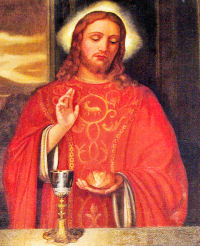
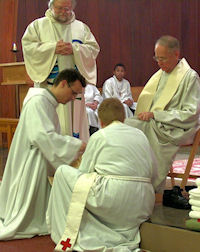 During the evening of Holy Thursday, the Mass of the Lord's Supper is celebrated. It is celebrated in the evening because the Passover began at sundown. There is only one Mass, at which the whole community and priests of the parish participate. This is a very joyful Mass, as we recall the institution of the Holy Eucharist and the priesthood. The priests wear white vestments, the altar is filled with flowers, the Gloria is sung and the bells are rung. After the Gloria, we shall not hear organ music and the bells until the Easter Vigil. The Liturgy of the Mass recalls the Passover, the Last Supper, which includes the Washing of the Feet. The hymn Ubi Caritas or Where Charity and Love Prevail is usually sung at this time. After the Communion Prayer, there is no final blessing. The Holy Eucharist is carried in procession through Church and then transferred into a place of reposition, usually a side chapel. The hymn Pange Lingua is also usually sung at this time.
During the evening of Holy Thursday, the Mass of the Lord's Supper is celebrated. It is celebrated in the evening because the Passover began at sundown. There is only one Mass, at which the whole community and priests of the parish participate. This is a very joyful Mass, as we recall the institution of the Holy Eucharist and the priesthood. The priests wear white vestments, the altar is filled with flowers, the Gloria is sung and the bells are rung. After the Gloria, we shall not hear organ music and the bells until the Easter Vigil. The Liturgy of the Mass recalls the Passover, the Last Supper, which includes the Washing of the Feet. The hymn Ubi Caritas or Where Charity and Love Prevail is usually sung at this time. After the Communion Prayer, there is no final blessing. The Holy Eucharist is carried in procession through Church and then transferred into a place of reposition, usually a side chapel. The hymn Pange Lingua is also usually sung at this time. 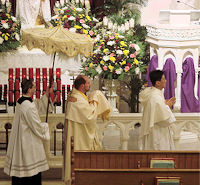 When the Eucharist is processed to the altar of repose after the Mass of the Lord's Supper, we should remain in quiet prayer and adoration, keeping Christ company. There is a tradition, particularly in big cities with many parishes, to try and visit seven churches and their altar of repose during this evening.
When the Eucharist is processed to the altar of repose after the Mass of the Lord's Supper, we should remain in quiet prayer and adoration, keeping Christ company. There is a tradition, particularly in big cities with many parishes, to try and visit seven churches and their altar of repose during this evening. 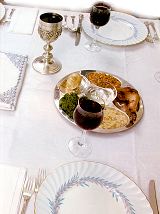 In imitation of Christ's last supper, many Christians prepare a seder meal or the pasch. Celebrating a paschal meal helps us comprehend the plan of redemption. We see the lamb, cooked whole, with no bones broken, foreshadowing the death of Christ, the Lamb of God. We eat the unleavened bread and recall to mind the Eucharist. We eat the whole meal in prayerful reminder of that Last Supper that Jesus spent with His apostles, His friends, instituting Holy Orders and leaving His greatest gift, the Holy Eucharist.
In imitation of Christ's last supper, many Christians prepare a seder meal or the pasch. Celebrating a paschal meal helps us comprehend the plan of redemption. We see the lamb, cooked whole, with no bones broken, foreshadowing the death of Christ, the Lamb of God. We eat the unleavened bread and recall to mind the Eucharist. We eat the whole meal in prayerful reminder of that Last Supper that Jesus spent with His apostles, His friends, instituting Holy Orders and leaving His greatest gift, the Holy Eucharist. 